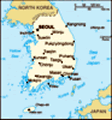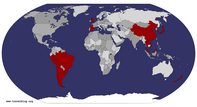Advertisement
Published: April 19th 2008
So this is it. We’re out of here.
‘The Hermit Kingdom’, ‘The Land of the Morning Calm’…..‘The ROK.’
When we said we were going to Korea the initial response invariably involved one of the following words:
‘War’
‘Danger’
‘Nuclear’
‘Wired’
‘Dog’
‘Nice’
‘Why?’
Ok so it’s probably most famous for the war and its nuclear neighbour and danger by default. Admittedly ‘nice’ only came up once in an alarmingly stereotypical response by a hairdresser ‘ohhh that’s nice’ which left me suitably stupefied.
The ‘dog’ response:
‘they eat dogs there you know’ cropped up way too many times in the weeks before our departure, accompanied by a knowing look and serious bet-you-didn’t-know-that eyebrows. I wonder how many people respond to:
‘I’m going to France’ with
‘They eat horses there you know’ As if it’s a national pastime.
But then what do the majority of (English) people really know about this country…. After a year here I still don’t know much but I like to think I know it a little better. What I do know is that there’s a hell of a lot more positive things to be said than just that it’s ‘wired.’
Ahh the food. I know it won’t be long after we leave before the cravings start. Bibimbap will lead the way. I will crave it the way I crave lasagna or tortellini (which incidentally I am craving quite painfully after a year without). Bibimbap is a whole load of steamed vegetables, shreds of ‘kim’ (dried seaweed), egg, rice, seasoning and the all important dollop of red pepper paste you mix it all together with. And thoughts of Chamchi Jiggae, boiling in its stone cooking and serving pot, thick with kimchi, tuna and mouth-watering spiciness will no doubt creep into my mind even when we’re enjoying the culinary delights of Thailand. This is the one thing I learnt how to make during my time here. Expats rarely cook when you can have a decent meal out for 4 dollars.
Korean BBQ leads the way for the ultimate Korean dining experience. Sitting on floor cushions around your very own sunken table BBQ, adding garlic, spiced bean sprouts and the exotic relatives of ‘normal’ mushrooms, downing shots of soju, picking the cooked meat off the grill with chopsticks, dipping it in spicy concoctions of garlic and chilies, making delicate parcels of
meat and banchan in big green leafs, knocking back some more soju (a Korean drink similar to vodka).
The Korean BBQ is a lengthy affair that is Christmas-esque in the eating challenges it provides. Just when you think you can’t take any more a bowl of nengmyong or deonjonjigae which looks suspiciously like a meal in itself (it actually is) gets thrust infront of you. It’s all to be savoured and appreciated as audibly as possible, with much slurping and cries of
‘Mashiketa!’ (Delicious!).
The BBQ is surrounded by banchan (side dishes). Some restaurants have as many as 30 banchan most of which are completely unidentifiable if you don’t know Korean food. You will doubtless have at least one type of kimchi. Kimchi is present at every Korean meal, it’s normally pickled cabbage served in red pepper paste but it comes in many different forms and you will doubtless have a strong and instant dislike to at least some if not all of them. Kimchi doesn’t care, it’s fiery and unapologetic like an ajumma. Most people learn to love it and then become strangely addicted (the same can’t be said for ajummas - old women who don’t take
any crap). Do not underestimate the importance and prevalence of Kimchi. There is even a museum in Seoul dedicated to it.
Drinking is also hugely popular, unlike in South-East Asia. The national drink is Soju, it varies from 20-40% and is pretty good at knocking you out. Drinking is especially popular among businessmen and you see them staggering out of hofs (bar/pub) and pochangmachas (orange tents for cheap food and drinks). Even drinking in the Jimjilbang (sauna), anything goes. Of course being English we felt right at home.
But it’s not all eating, drinking and general merriment…there is also the death-trap that is the average Korean road. Having travelled through South-East Asia including Vietnam home of the ‘cross-and-pray’ technique of crossing 6 indeterminate lanes of swerving motorcycles, I was surprised to find myself ill-prepared for the driving style out here. The driving is actually very similar to that found in Vietnam with the crucial difference that in Korea it is cars not motorcycles that are been swung about with wild abandon.
The generally subscribed to method of acceleration and braking is by pinning respective pedals to the floor in rapid succession. Similar to the way you might
frantically work the pedals of a pinball machine. You can’t help but feel that the powers of luck not skill are at work. Of course not all Koreans drive like this, it is mainly the ‘professional’ drivers (taxi drivers, delivery guys, bus drivers) who subscribe to the pinball style. These guys love to ignore red lights, cut people up, swing around corners, slam all on and watch TV while they’re doing it. Don’t go relaxing on the pavement either because you’re sharing it with motorcycles.
But when you’re feeling frazzled ‘Service’ comes to the rescue. ‘Service’ is a magical Konglish word that means you have gained a freebie of some form or another. For example, you have just paid for your meal and the owner starts enthusiastically gesturing towards the ice-cream freezer ‘Service! Service!’ Coffee is normally ‘service’ in restaurants and water is always ‘service.’ You can also be given service without spending a penny. Three trips to the dentist without any money changing hands goes a little beyond most normal definitions of ‘service.’
Konglish is everywhere ‘credit card-errr’ ‘teksi’ (taxi) ‘hand-pone’(cell-phone) ‘spoon-err’ ‘pork-err’ (fork) ‘apart-tur’ (apartment). A lot of English words but with Korean pronunciation. Similar
to the way people speak ‘Spanish’ by sticking an ‘o’ on the end of an English word you might like to try an ‘er’ or an ‘ee’ to make yourself understood in Korea. We live near a branch of Top Mart and this is the easiest place to ask taxi drivers to ricochet us to. It didn’t take us long to realise the name ‘Top Mart’ doesn’t exist in Korea. You will be understood by approximately 5% of Korean teksi drivers unless you stick an ‘err’ on the end of the ‘Mart’. Using the ‘err’ took our success rate up to about 90%. We were happy with this until one day I read the Hangul on the sign and saw it is actually pronounced ‘Tap Mat-err.’ (Korean script was created by linguistics so it’s a learners dream: 24 entirely phonetic symbols, once you’ve learnt them you can pronounce anything. A sharp contrast to the sprawling mess that is the English writing system). I am happy to report that with this slight change we upped our success rate to 99%. Unfortunately there is still the occasional taxi driver who can only accept bus station/train station/hotel as valid destinations for Waegooks (foreigner)
and will do his utmost not to open his ears. ‘e’ is another common suffix for English words (both for Konglish and for Koreans actually speaking English) to make them acceptable to Korean ears so you will hear ‘change-ee’ ‘orange-ee’ ‘strange-ee’ and of course the most common of all in our line of work…. Englishee.
With different cultures come different beliefs, assumptions and ‘truths,’ one of the most interesting and controversial in Korea is ‘Fan-Death.’ Fan death is quite simply the belief that if you sleep in a room with a fan on and the window closed you might never wake up again. There are various ways in which you can come to an untimely end at the hands of a fan. http://en.wikipedia.org/wiki/Fan_death
If you ever get the opportunity to discuss this with a Korean you may be surprised by the vehemence and conviction with which they declare the existence of fan-death.
Other parts of the culture and traditions have become ‘normal’ to us and we may even struggle to stop doing them. Taking and receiving things with two hands, bowing, taking shoes off inside (even in restaurants), sitting on the floor, eating almost everything with chopsticks, not

 Couple-cardies
Couple-cardies
Korean couples like to wear the same clothes:)writing names with red pen (names are only written in red when people die). We even got dressed up in Hanboks (the traditional Korean dress) for Lunar New Year when the kids came and bowed to their elders (us) and we gave them money (the schools). Being children politeness is still a work in progress and some of them needed reminding ‘two hands.’ Seemed strange to be teaching them how to behave in their own culture.
It’s been quite a year, we’ve seen a lot and had some fantastic experiences. Korea’s certainly got more going for it then a lot of people think. It’s a very mountainous country and there are some beautiful places (as I hope the pictures show). One of my favourite things was the seasons. Korea has the most spectacular show of nature in autumn and spring, when everywhere is bright with colours and the sky is blue almost everyday.
I’m going to miss the cuteness of the kindergarten kids (who knocked me off my feet with hugs when I said goodbye) but I’m thrilled to be moving on. There were points when it looked like we wouldn’t see out the contract but the dangling
carrot of severance pay got us through in the end. I still liked being in Korea but teaching in the (TEFL) classroom can be a challenging / frustrating place to be at times. The energy and enthusiasm of the kids that makes the job so much fun can also drive you frigging crazy! But we got there and all in all it’s been a fantastic experience especially being able to get to know a country as more than a tourist.
But now it’s time for the backpacks to come out and the days of the week to become irrelevant. First stop China.
So long Korea and thanks for all the Kimchi
Advertisement
Tot: 0.099s; Tpl: 0.017s; cc: 8; qc: 28; dbt: 0.0479s; 1; m:domysql w:travelblog (10.17.0.13); sld: 1;
; mem: 1.1mb























Franco
Franklin H
Haha, great accounts and photos.